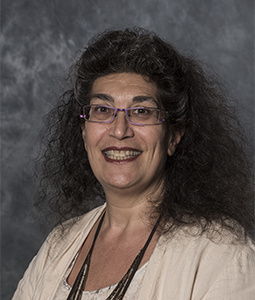School of Medicine Columbia
- SC.edu
- Study
- Colleges and Schools
- School of Medicine Columbia
- About
- Faculty and Staff
- Carole Oskeritzian
Faculty and Staff
Carole Oskeritzian, Ph.D.
| Title: | Associate Professor of Pathology, Microbiology & Immunology |
| Department: | Pathology, Microbiology & Immunology School of Medicine Columbia |
| Email: | carole.oskeritzian@uscmed.sc.edu |
| Phone: | 803-216-3462 |
| Fax: | 803-216-3413 |
| Office: |
Pathology, Microbiology & Immunology |

Education
Training:
The Pasteur Institute, Paris, France
Virginia Commonwealth University
Education:
B. S. Biology-Paris-Val-de-Marne University (Paris 12), France
M.S. Biology & Biochemistry- Paris-Val-de-Marne University (Paris 12), France
M.S. Immunology-Denis Diderot University (Paris 7), France
Ph. D. Immunology- Denis Diderot University (Paris 7), France
Research
The overall goal of my research is to identify new therapeutic strategies targeting inflammatory processes. We are particularly interested in studying the cellular and molecular events taking place in allergic airway and skin inflammatory diseases, such as asthma and atopic dermatitis, and their exacerbations, including life-threatening anaphylaxis.
The major culprit of allergy-driven diseases is the mast cell. We are investigating many aspects of human and rodent mast cell biology from ontogeny to survival to phenotype plasticity and functions. To this end, we are using in vitro and in vivo pharmacological, molecular and genetic approaches. We recently discovered that a potently bioactive sphingolipid metabolite sphingosine-1-phosphate (S1P) can be released from mast cells, in addition to a variety of mediators such as histamine, cytokines, chemokines and other lipid components, upon allergic stimulation and act on its own receptors on mast cells supporting an autocrine inflammatory amplification loop.
In particular,
- We propose to further examine the roles of S1P, the kinases that produce it and its receptors in regulating mast cell development and functions. We have established the relevance of S1P and its receptor S1PR2 in acute exacerbation of systemic allergic reaction called anaphylaxis. Our current research aims to assess the role of mast cells and S1P as key coordinators of multiple disease processes leading to the establishment of chronic allergic inflammation and tissue remodeling for which there is, presently, no cure.
- Mast cell proteases determine their responsiveness to stimuli and drug sensitivity. We are studying how chymase expression is regulated by IL-6 and its correlation with the surface expression of the receptor for anaphylatoxin C5a, CD88, generated upon complement activation. Moreover, chymase expression correlates with enhanced survival, another area under investigation. Interestingly, we found that S1P enhances chymase and CD88 expression in developing human mast cells, which display a hyperresponsive phenotype. Therefore S1P could be an important player in regulating chymase, CD88 expression and mast cell responsiveness to stimuli.
- Bone marrow, blood, lung and skin eosinophilia, or increased numbers of eosinophils, is frequently observed in patients with inflammatory disorders and a hallmark of asthma and atopic dermatitis. IL-5 is the most selective cytokine related to eosinophil differentiation as the expression of its receptor is limited to eosinophils and basophils. Stimulation of human cord blood-derived progenitor cells with IL-3, IL-5 and GM-CSF leads to the exclusive upregulation of the IL-5R alpha subunit, a pivotal step in eosinophil lineage commitment. However, the unresponsiveness to all three cytokines in mice does not prevent the development of eosinophils, suggesting the intervention of other factors in eosinopoiesis. We are investigating how the mast cell/S1P/eosinophil triad could also constitute a functional unit to sustain chronic inflammation of the lungs and skin.
Our proposed studies will lead to a better understanding of the mechanisms underlying persistent inflammation and facilitate mechanistically tailored therapies targeting local regulatory pathways in inflammation with a central role for mast cells.